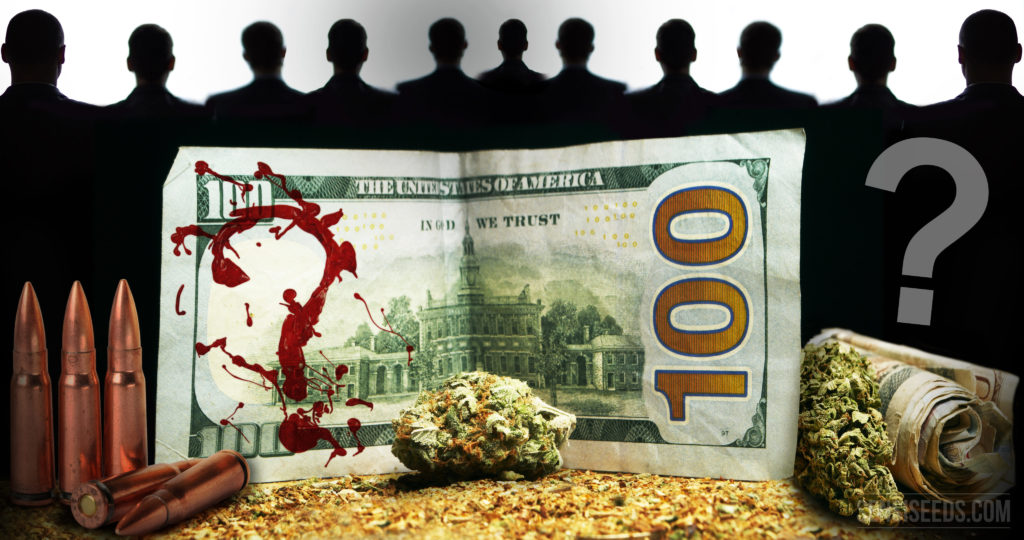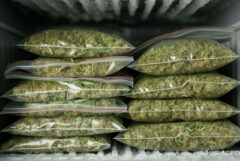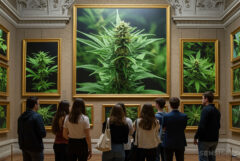The ban on cannabis was supposed to protect society from the threats of murder, mayhem, addiction, and full-scale collapse that were trumpeted by everyone from politicians to Parent Teacher Associations. Nearly a century later, its illegality has caused the very problems it was intended to solve. So who benefits from cannabis prohibition really?
People opposed to cannabis would tend to give “drug dealers” as their first answer to this question. Their idea of such is generally a scary, shadowy, street-lit figure, a silhouette with the de rigueur hoody and cap offering the first fix for free in order to snare more unsuspecting victims in a web of horror. For people who are better informed and less susceptible to propaganda, it takes a moment to remember that ‘drug dealer’ can be used to refer to the easy-going gardener who ‘sorts them out’, the person dressed as a mermaid drifting around the chai stall at a festival softly asking if anyone wants to buy hash, their friends, or even themselves.

There are many ‘drug dealers’ who stick purely to cannabis (usually for reasons of ethics, personal safety, and because they cultivate their own stock) and operate on the basis of “I’ve got weed or hash or nothing”. This group doesn’t benefit from cannabis prohibition; on the contrary, they are harmed by it. The other group is a stereotype that has little basis in reality if we’re talking about people who deal only in cannabis, and not much more if referencing those who supply small amounts of other drugs. Poly drug dealers purvey a wider range of substances and if they’ve run out of one, may offer another (a practice which propagates the myth that cannabis is a gateway drug). It is often not even these people who are problematic, or who are reaping the most benefit from cannabis prohibition. They are simply the shop staff for organised crime groups. It is the industry of bulk supply where things get dangerous, and the more money is involved, the greater the risk.
Organized crime groups unquestionably benefit from cannabis prohibition
Cannabis will be of interest to organized crime groups for as long as it remains illegal. With a steady demand, tax-free profits and an unregulated, relatively simple production process, why wouldn’t it be? The 2016 EU Drug Markets report states that “The estimated value of the retail market for cannabis in the EU is over €9.3 billion in 2013, with a likely range of €8.4 – €12.9 billion. This represents just under two-fifths of the total illicit market in drugs.”.
The parallels between the current status of cannabis and that of alcohol during the Prohibition in the US are inescapable. The Mafia and similar groups no longer trade in alcohol because there is no profit in doing so. Their methods are unethical, unscrupulous, and ruthlessly efficient. They attract those who place far higher value on cash than on quality of product, safe and humane working conditions, and even human lives. Organised crime gangs are also all too willing to extend cannabis credit to those unable to repay it, and then force them into acts they otherwise would never have undertaken in order to make good the debt. Large-scale, illegal cannabis production generates cash flow which is ploughed back into the black market, whitewashed (more on that later), or used to fund activities which are far worse than growing plants.
Terrorists benefit from cannabis prohibition
Organized crime syndicates are not the only groups who benefit from the illegal status of cannabis. New evidence from Italian police suggests that ISIS and the Italian Mafia are working together to transport cannabis from North Africa to Europe. In April this year Franco Roberti, Italy’s national anti-mafia and anti-terrorism head, said that ISIS controls significant sections of the European hash-smuggling route in Libya and the Mediterranean. The terrorist organisation apparently gains around 7% of its funding from drug trafficking, even though cannabis (and other intoxicants) are strictly forbidden under Sharia law. According to the Quran 5:90, “Intoxicants… are but defilement from the work of Satan, so avoid [them] that you may be successful.” According to Sayyid Ali Khamenei, a religious authority and the current head of the Islamic Republic of Iran, in his book Practical Laws of Islam: “It is haram [religiously forbidden] to use narcotics in any way … By the same token, it is haram to deal in narcotics in any way, i.e., carrying, transporting, storing, selling, buying, etc.”. (ISIS are, obviously, terrible at being Muslims.) According to Mr Roberti in his book The Opposite of Fear, rather than trying to strengthen prohibition, the better tactic would be to remove it: “Decriminalisation or even legalisation would definitely be a weapon against traffickers, among whom there could be terrorists who make money off it”.
This is not a new phenomenon, and sometimes the money is simply taken out of the equation: back in 2002, US authorities foiled an alleged attempt by a U.S. citizen and two Pakistanis to swap tons of hashish and heroin for Stinger missiles that they planned to sell to al Qaeda.
The arms trade benefits from cannabis prohibition
Terrorist organisations want to be armed to the teeth. Blatantly, a large proportion of their profits from controlling drug trafficking is spent on buying weapons. This is equally true of cartels such as the ones fighting the bloody and extensive war in Mexico, especially on the border with the US, where the illegal drug trade has cost hundreds of thousands of lives. It is difficult to pinpoint exactly how much of the cartel profits come from cannabis alone. Estimates range from 15% to 60%, but this is based solely on cannabis transported from Mexico to the US, and leaves out cannabis grown on US soil by cartels.
The cartel side is supplied by a combination of weapons ‘diverted’ from the US military and Mexican law enforcement, and military-grade weaponry which is legally available in the US. This includes fully automatic weapons made before 1986 and – in 43 states – “assault weapons”, loosely defined as semi-automatic firearms with high capacity magazines. The black market trade in the latter is made even easier by the fact that most states do not require lost or stolen firearms to be reported. Weapons are then smuggled into Mexico, paid for by drug sales and sometimes simply swapped for cannabis. A recent report from the organized crime division of the Mexican Attorney General’s Office (PGR) on weapons seized from cartels states that “… three out of four were long-arms, with the majority of those high-powered rifles only legally permitted for use by the armed forces. More than 70% came from the United States. Among the weapons seizured (sic) were also fragmentation grenades, rockets, and anti-personnel mines”.

The law enforcement side is supplied by both the Mexican and US governments. Between 2009 and 2015, Mexico received over $1.2 billion dollars in weapons, training and aid from the US under the Merida initiative, and was expected to receive a total of $2.3 billion. The sum included Black Hawk helicopters manufactured by Sikorsky Aircraft, a subsidiary of the world’s biggest arms manufacturer Lockheed Martin. The two long guns most commonly used by the cartels are the AK-47 and .223 calibre models, including AR-15 rifles. Both types are manufactured in the US.
What is absolutely clear from looking at just this battlefield is that the real victors are those who are manufacturing and selling the weapons used by both sides. Whether the money comes from governments or cartels, a significant amount of it is generated by cannabis prohibition and flows into companies that churn out instruments of death. This holds true for every land that is affected by the War on (some) Drugs.
Banks benefit from cannabis prohibition
So how are these huge sums of money moving around? Obviously the legal side of the arms trade can use the banking system with impunity, but what about the illegal side? Plus, there is a huge amount of money made from illegal drugs, including cannabis, that isn’t spent on weaponry. The cinematic device of suitcases full of cash may well move from hand to sweaty hand for smaller deals, but when the sums run into the hundreds of thousands, this simply won’t suffice.
A brief history of drug money laundering
As far back as the early 1980s, the Organisation for Economic Co-operation and Development (OECD) in Paris first noticed that substantial sums of Italian Mafia money was moving through the international banking system, going from black to white as it did so. The Financial Action Task Force (FATF) was established to crack down on this, and slowly but surely did so. As banking institutions got larger and more global, it became harder for illegal money to enter its systems.
This changed in the early 2000s. The first financial crisis hit, and FATF controls weakened, especially with regard to offshore jurisdictions. Proceeds from drug crime once more made their way into the banking system. In Mexico, currency exchange houses known as casas de cambio that dealt with international cash transfers and travellers’ cheques were doing a lot of business with the American Wachovia bank. Now owned by Wells Fargo, in 2004 it was one of the biggest banks in the US and already turning a blind eye to the huge transactions taking place in the form of cash deposits, sequentially-numbered travellers’ cheques and purchases of (among other things) aeroplanes that were being facilitated by its casas de cambio.
Wachovia was not alone. HSBC dealt with $376 billion (around €335.8 billion) for Wachovia, and when Wachovia was investigated in 2009 and its activities stopped, HSBC blithely continued accepting and processing vast sums of money from cartels. Using casas de cambio, banks in Mexico and California which it had purchased, and its own branches, HSBC facilitated drug money laundering and even banking for terrorist organisations.

Of course, this money benefited the banks. Between 2008 and 2011, in the grip of the global financial crisis, banks were desperate for liquid assets which had dried up from legitimate sources and inter-bank loans. Partly thanks to the efficacy of FATF in previous years, and partly due to the escalation of the War on Drugs which made them all the more profitable, organised crime groups had the cash that the banks so badly needed.
This is not conjecture. In 2009 and 2012, Antonio Maria Costa, Executive Director of the United Nations Office on Drugs and Crime (UNDOC) gave interviews in which he explicitly stated that money made from international drug trafficking was used to rescue banks during the financial crash. From the 2012 interview with Executive Intelligence Review:
“EIR: Did the financial crisis offer an opportunity for the criminal associations to get their money in, or was the financial crisis an opportunity for the banks to bring more money in? Which side does it come from?
Costa: The penetration of the financial sector by criminal money has been so widespread that it would probably be more correct to say that it was not the mafia trying to penetrate the banking system, but it was the banking sector which was actively looking for capital—including criminal money—not only as deposits, but also as share acquisitions and in some cases, as a presence on Boards of Directors.”
In 2009, he stated that this black money was “the only liquid investment capital” available to some banks on the brink of collapse in 2008, and that a majority of the $352 billion (€314 billion) of drugs profits was absorbed into the economic system as a result. Whether unwittingly or not, the entire world banking system from CEOs to cashiers benefitted from cannabis prohibition.
Who would profit if cannabis was legal?
This article, long and serious though it is, begs several fanciful questions. What state would the economy have been in, and be in now, if the trade in cannabis was legal? If the humongous deposits of cash were legal, and therefore taxable? How much money currently devoted to arming the governmental forces who wage the war on drugs could be used for schools, healthcare, community centres? Who would we rather see reaping profits, ethical farming cooperatives or weapons manufacturers? And, having read this, do you really think that the front line ‘drug dealers’ are the ones benefiting from cannabis prohibition? Let us know in the comments.











That’s an intriguing question! Cannabis prohibition appears to serve several factions, such as private prison investors and some drug producers who are business opponents of medical cannabis. However, it mainly harms consumers, patients, and the economy by preventing access to a clean regulated market. Legalization of marijuana would increase the public health, boost employment opportunities and lessen unwarranted imprisonment- so it begs the question who exactly is the causal under these regressive laws
I think you forgot that states strengthen their grip by policing its citizens!
What piss’s me off is I can buy Alcohol + Codine – Valys ECT what every I want with online websites in the UK. but can’t buy Weed or Magicmushrooms to help me Deal with my PTSD from a Motor bike Accident in 2008 & yes I tried antidepressants the don’t work for me but now feeling a lot better on Cannibis by Microdosing.
The UK is fighting a loosing battle with the Drug Trade it’s ok for Amsterdam – Italy – Spain so yes legalise Weed & Magic Mushrooms.
Short answer: yes, stopping only ant the point where the dilutability/dispersability allows for a terroristic attack on a village. So 1 ton of weed: ok – but 10 litres of LSD not ok as it would be catastrophic if put into the watersupply.
To expand: any kind of self harming behaviour that doesnt endanger your fellow women and doesnt force them to witness should be legal.
I definitely enjoying every little bit of it. It is a great website and nice share. I want to thank you. Good job! You guys do a great blog, and have some great content.!
Awesome article, actually I was looking a website like this, I found all information here. You’re all article are gorgeous, I am very impressed. Thanks for sharing with us and keep posting.
For real! Nicotine and alcohol are the worse of all drugs and addictions.
Nice posts! I was checking constantly this blog and I am impressed! It`s very wonderful article that says about legal drugs. It`s funny to know that drugs that been selling are the drugs that can cause as of additions. Thank you for sharing it.
People nowadays are really got depressed into their life and came-out into drugs addiction or alcohol addiction,Especially those teens right now at our new generation. We must not let them to be not treated, instead let us help them to be in rehab.
Good blog, it`s really good to read. that`s really the real point why it is legal if those of it was a part of a drugs there most be suppose to be in illegal one.
Good read, thank you
Good article – Given that states in the US that have legalised / de-crimalised dope are doing well with no obvious down-sides, I honestly believe that a wave of marijuana legalisation will flow through western society in the near future. Legalise it, Tax it, and treat abuse of it as a health rather than criminal issue.
Australia, where marijuana use is prevalent would be a likely early-adopter once the wave starts rolling…
can your product, seeds , be mailed to me in U.S.,and I get them without legal problems here,upon my picking them up , at my P.O. box?
Hello Dave,
Sadly we can not send seeds overseas yet due to international legislation. Please find below a link to the list of countries to which we can send seeds. https://sensiseeds.com/en/blog/to-which-countries-…
Thank you!